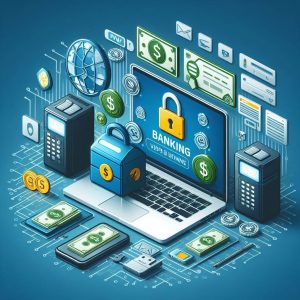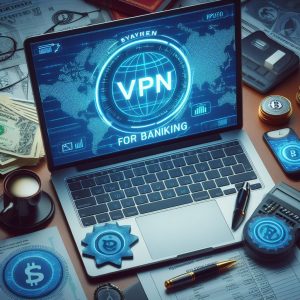Introduction
Online banking has become an indispensable part of modern life, enabling us to manage our finances conveniently from anywhere at any time. However, this convenience also comes with significant risks, especially when accessing financial information over public Wi-Fi or unsecured networks. Using a virtual private network (VPN) can greatly enhance the security of online banking by encrypting internet traffic and hiding your IP address. This article will discuss the importance of online security for banking, the risks of accessing accounts without a VPN, and how to choose and utilize a VPN to safely manage bank accounts online.

Why Use a VPN for Banking?
Online banking platforms utilize encryption and other security measures, but public Wi-Fi connections are often unsecured, making it easy for hackers to intercept login credentials, account numbers, balances, and transactions. A VPN creates a private, encrypted tunnel between the user’s device and the wider internet, hiding the IP address so that hackers cannot pinpoint your location or identity. VPN encryption also scrambles data so that any intercepted information is unusable.
Other key risks that a banking VPN can mitigate include:
- Phishing scams where hackers create fake bank websites to steal login details
- Malware or spyware that infect devices and capture information
- Network spoofing to trick users into entering information on malicious sites
- Man-in-the-middle attacks where communication is secretly intercepted
By routing traffic through an encrypted VPN tunnel, online banking sessions are protected from all these threats, regardless of the network. Finance apps on smartphones can also connect to the VPN for an extra layer of mobile security.

Features to Look for in a VPN for Banking
When researching VPNs for safely accessing bank accounts online, there are several key features to consider:
Powerful encryption – Banking requires at least 256-bit AES encryption to secure data. Leading VPN providers typically offer this as standard.
No-logs policy – To preserve privacy, VPN companies should not log and store user activity data such as browsing history and connection times. Ask potential services about their logging policies.
Kill switch – This safety feature blocks all internet access if the VPN unexpectedly drops, preventing identity exposure until the encrypted connection is restored.
Obfuscated servers – These special servers disguise VPN traffic to bypass blocks, enabling reliable access for banking.
Strong protocols – OpenVPN and IKEv2/IPSec protocols offer the best combination of speed and security for banking VPN connections.
Reliable connections – Look for VPN apps that automatically reconnect when coverage drops or switch seamlessly between Wi-Fi and mobile data.
Access to servers in banking country – To comply with finance regulations, banking VPNs need to provide local IP addresses from countries where account holders need to log in.
Best VPNs for Banking in 2024
Based on the criteria above, these leading options stand out as the top VPNs for safe online banking in 2024:
NordVPN – Excellent all-rounder VPN with AES-256 encryption, a clear no-logs policy, 6,500+ servers worldwide, impressive speeds, 6 simultaneous connections, and handy features like CyberSec malware blocking. Reliably secures banking sessions.
Surfshark – Budget-friendly banking VPN option with private DNS and leak protection, strong AES-256 encryption, and 3,200+ servers. Can connect an unlimited number of devices.
Atlas VPN – Fast growing VPN app with bank-grade 256-bit encryption, data breach monitoring tools, and a large network of over 750 servers with unlimited speeds and bandwidth. Also blocks suspicious banking sites.
CyberGhost – Veteran provider with strong privacy standards and over 7,400 servers across 90 countries. Offers dedicated IPs for banking in specific jurisdictions. Includes port forwarding for improved speeds.
There are also other reputable options like ExpressVPN, IPVanish, TunnelBear, Private Internet Access, and ProtonVPN which provide secure connections for managing finances online through VPN protection.

How to Safely Access Online Banking With a VPN
Follow these simple steps to start using a VPN to keep online banking protected and private:
1. Select a suitable VPN service
Choose a provider from the top recommendations above that aligns with banking needs – consider countries, server locations, number of connections allowed, and security features offered.
2. Download and install VPN apps
Acquire the software for devices that will access online bank accounts like PCs and mobile devices. VPN setup wizards simplify the installation process.
3. Create VPN account credentials
Register with the VPN provider’s portal by establishing a username and strong master password for accessing their private network. Enable two-factor authentication for an additional account security layer.
4. Log into the VPN app and connect
Use the VPN login details to access their apps and servers. The quick connect feature identifies the optimal server locations like United States or United Kingdom banking nodes.
5. Verify the encrypted VPN connection
Check that the VPN has assigned a new IP address different from the regular one indicating active encryption. The VPN icon in the system tray or status bar also typically animates when successfully connected.
6. Launch banking website or app sessions
Once connected to the banking VPN server, open the bank’s website from a secure browser like Firefox or Chrome. Alternately, login via iOS/Android finance apps to manage accounts safely behind the scenes.
7. Log out and disconnect VPN when done
After completing online banking activities, log out of bank accounts as usual. Then disconnect from the VPN server to free up resources. VPN apps run silently in the background when not actively routing traffic.
Conclusion
Safe online banking relies on secure internet connections. VPN services deliver vital protection through robust encryption that conceals data and activities when accessing financial accounts and conducting sensitive transactions. Leading VPN providers expressly designed for banking also hide IP addresses and redirect traffic through private tunnels to keep identities safe.
Choosing reputable VPN software and connecting to remote servers before logging into bank websites or apps provides reliable security. Banking VPNs combat a wide range of cyberthreats from public Wi-Fi snooping to sophisticated malware solely focused on capturing the personal details that unlock extensive financial loss. So don’t gamble with signing into accounts straight from bare internet connections. Instead, run banking activities exclusively over a trustworthy VPN for fitness club-level security and privacy.